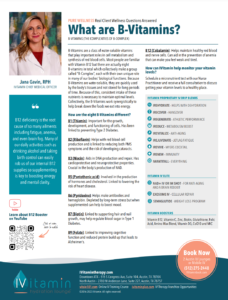B-Vitamins are a class of water-soluble vitamins that play important roles in cell metabolism and synthesis of red blood cells. Most people are familiar with Vitamin B12 but there are actually eight B-vitamins in total which collectively make a group called “B-Complex”, each with their own unique role in many of our bodies’ biological functions. Because B-Vitamins are water-soluble, they are quickly used by the body’s tissues and not stored for long periods of time. Because of this, consistent intake of these nutrients is necessary to maintain optimal levels. Collectively, the B-Vitamins work synergistically to help break down the foods we eat into energy.
How are the eight B-Vitamins different?
B1 (Thiamin): Important for the growth, development, and functioning of cells. Has been linked to preventing Type 2 Diabetes.
B2 (Riboflavin): Helps with red blood cell production and is linked to reducing both PMS symptoms and the risk of developing cataracts.
B3 (Niacin): Aids in DNA production and repair. Has cardioprotective and neuroprotective properties. Crucial in the body’s production of NAD.
B5 (Pantothenic acid): Involved in the production of hormones and cholesterol. Linked to lowering the risk of heart disease.
B6 (Pyridoxine): Helps make antibodies and hemoglobin. Depleted by long-term stress but when supplemented can help to boost mood.
B7 (Biotin): Linked to supporting hair and nail growth, may help regulate blood sugar in Type 1 Diabetes.
B9 (Folate): Linked to improving cognitive function and reduced protein build up that leads to
Alzheimer’s.
JOIN OUR COMMUNITY
Receive tips on wellness and nutrition, healthy food recipes, amazing workouts, events that bring our community together, and special offers directly to your inbox!
Contact & Visit
Hours of Operation
M: 10am-5pm
Tu: Closed
W-Th: 10am-3pm
F-Su: 10am-5pm





